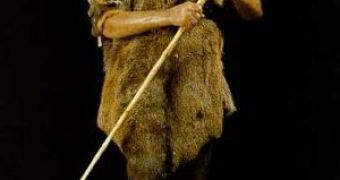Intelligence is not everything. That's the basic moral of the story of Neanderthals' disappearance. One assumption often made about the competition between modern humans and Neanderthals is that the former were better hunters that the latter. It is supposed that the superior intelligence of modern humans made them superior hunters.
However, according to certain anthropological evidences, Neanderthals apparently were more intelligent than modern humans and not less intelligent. A new study forthcoming in the February issue of Current Anthropology further supports this idea from a different perspective.
New archaeological data from a Middle-and Upper-Paleolithic rock shelter in the Georgian Republic, dated to 60,000-20,000 years ago, seems to prove that the Neanderthals were at least as good at hunting as early modern humans: The researchers found virtually no difference between the hunting practices of Neanderthals and early modern humans. Thus, the disappearance of the Neanderthals cannot be attributed to this any longer.
"Each population was equally and independently capable of acquiring and exploiting critical information pertaining to animal availability and behavior," write the anthropologists, from the University of Connecticut, University of Haifa, Hebrew University, and Harvard University.
The study has important implications for debates surrounding behavioral evolution and practices that eventually allowed modern humans like us to displace other closely-related species.
The researchers suggest that developments in the social realm of modern human life, allowing routine use of distant resources and more extensive division of labor, may be better indicators of why Neanderthals disappeared than hunting practices. This idea complements Jared Diamond's older idea that the ultimate cause of Neanderthal extinction was their less skilful language abilities (as studies of their larynx seem to indicate). This hampered their social life and their ability to make rapid innovations.
"The establishment of larger social networks allowed the replacement of Neanderthals in the Caucasus," write the authors. "Our study also indicates that this process of replacement by modern humans spread beyond the traditional biogeographical barrier [of] Neanderthal mobility represented by the Caucasus Mountains."
Photo credits: Neanderthal Museum

 14 DAY TRIAL //
14 DAY TRIAL //